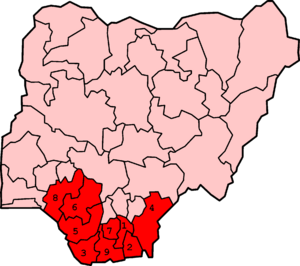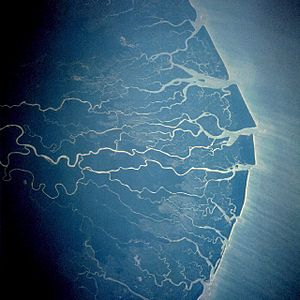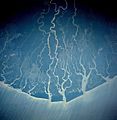Niger Delta facts for kids
The Niger Delta is a special land area in Nigeria, West Africa. It is formed where the mighty Niger River flows into the Atlantic Ocean. Imagine a river spreading out into many smaller streams and channels before reaching the sea – that's a delta! This area is home to millions of people and is very important for Nigeria's economy.
Contents
What is the Niger Delta?
The Niger Delta is one of the largest river deltas in the world. It covers a huge area, about 70,000 square kilometers (27,000 square miles). This region is made up of many different landscapes. You can find dense mangrove forests, swamps, and rainforests here. The land is crisscrossed by countless rivers, creeks, and lagoons.
How a Delta Forms
A delta forms when a river carries a lot of sediment (like mud, sand, and tiny rocks) as it flows. When the river reaches a large body of water, like an ocean, it slows down. The slower water can no longer carry all the sediment, so it drops it. Over thousands of years, this dropped sediment builds up, creating new land. This new land is often flat and very fertile, meaning it's good for growing crops.
People of the Delta
Many different groups of people live in the Niger Delta. Some of the largest groups include the Ijaw, Urhobo, Itsekiri, and Ogoni people. For centuries, these communities have relied on the delta's natural resources. Fishing and farming are traditional ways of life here. The delta's waterways are like roads, connecting villages and towns.
Oil and Gas in the Delta
The Niger Delta is famous for its huge reserves of petroleum (also known as crude oil) and natural gas. Nigeria is Africa's biggest producer of oil, and most of this oil comes from the Niger Delta.
How Oil is Found
Oil and gas are formed deep underground from ancient plants and animals. Over millions of years, heat and pressure turn these remains into fossil fuels. In the Niger Delta, these fuels are found beneath the land and under the ocean floor. Companies use special equipment to drill deep wells to bring the oil and gas to the surface.
Natural Gas Flaring
When oil is extracted, natural gas often comes out with it. Sometimes, this gas is collected and used. But in the Niger Delta, a lot of the natural gas is simply burned off into the air. This process is called "gas flaring." You can often see huge flames burning day and night in the delta.
Environmental Challenges
Gas flaring and oil spills cause serious environmental problems in the Niger Delta. These issues affect the land, water, and the health of the people.
Pollution and its Effects
- Air Pollution: Gas flaring releases harmful gases into the air. This can cause breathing problems for people living nearby. It also adds to climate change.
- Water Pollution: Oil spills, whether from pipelines or accidents, pollute the rivers and creeks. This oil harms fish and other aquatic animals. It also makes the water unsafe for drinking, bathing, and fishing.
- Land Pollution: Spilled oil can soak into the soil, making it difficult for plants to grow. This affects farming and the natural vegetation.
Impact on Livelihoods
The pollution directly affects the traditional ways of life in the delta. When fish die from oil spills, fishermen struggle to catch enough to feed their families or sell. When farmlands are polluted, farmers cannot grow crops. This makes life very difficult for many communities.
Social and Political Issues
The wealth from oil production has also led to many challenges in the Niger Delta. While a lot of money comes from the oil, many local communities feel they do not benefit enough.
Demands for Development
Local people often demand that more of the oil money be used to develop their communities. They want better schools, hospitals, roads, and clean water. When these needs are not met, it can lead to frustration and unrest.
Safety Concerns
Sometimes, disagreements over oil resources have led to safety concerns for oil workers. There have been instances where workers were taken against their will. This creates a difficult situation for everyone involved and disrupts oil production. Efforts are continuously made to ensure the safety of all individuals in the region.
Looking to the Future
Many people are working to find solutions for the challenges in the Niger Delta. There are efforts to clean up pollution, stop gas flaring, and ensure that oil wealth benefits the local communities more directly. The goal is to create a healthier environment and a more stable future for everyone living in this important region.
Images for kids
See also
 In Spanish: Delta del Níger para niños
In Spanish: Delta del Níger para niños
 | Kyle Baker |
 | Joseph Yoakum |
 | Laura Wheeler Waring |
 | Henry Ossawa Tanner |





